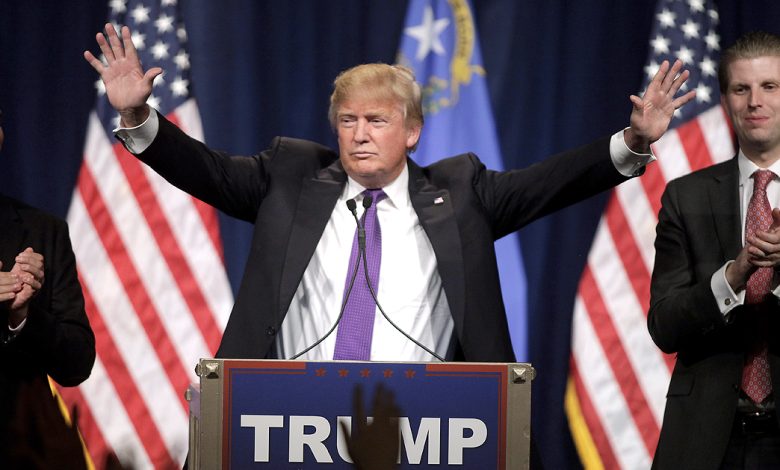ARTICLE AD
 Republican presidential candidate Donald Trump surrounded by his family declares victory, winning Nevadas First in the West presidential caucus at the Treasure Hotel & Casino in Las Vegas on February 23, 2016.
Donald Trump won Tuesday's Republican caucuses in Nevada by a wide margin, US networks projected, giving the billionaire businessman his third straight victory in the race for the White House. Early projections gave Trump 42 percent of the vote, with senators Marco Rubio of Florida and Ted Cruz of Texas trailing.
/ AFP / John Gurzinski/AFP (Photo credit should read JOHN GURZINSKI/AFP/AFP/Getty Images)
Republican presidential candidate Donald Trump surrounded by his family declares victory, winning Nevadas First in the West presidential caucus at the Treasure Hotel & Casino in Las Vegas on February 23, 2016.
Donald Trump won Tuesday's Republican caucuses in Nevada by a wide margin, US networks projected, giving the billionaire businessman his third straight victory in the race for the White House. Early projections gave Trump 42 percent of the vote, with senators Marco Rubio of Florida and Ted Cruz of Texas trailing.
/ AFP / John Gurzinski/AFP (Photo credit should read JOHN GURZINSKI/AFP/AFP/Getty Images)
On Monday, the U.S. Supreme Court issued a very significant judgment on former US President, Donald Trump, who is seeking to return to the White House.
The apex court ruled that Trump can claim immunity from prosecution for charges related to election subversion regarding actions taken in his official capacity as President. The Court clarified that while Trump may assert immunity for official acts, he remains subject to potential prosecution for unofficial actions.
According to the Supreme Court’s decision, “Under our constitutional structure of separated powers, a former President is entitled to absolute immunity from criminal prosecution for actions within his conclusive and preclusive constitutional authority. He is entitled to presumptive immunity from prosecution for all official acts.” However, the Court emphasized that there is no immunity for unofficial acts.
Previously, lower courts had rejected Trump’s attempt to dismiss the election subversion charges on grounds of presidential immunity. The Supreme Court’s ruling noted that while some allegations against Trump are straightforward, others present more complex legal questions.

 (2).png) 4 months ago
35
4 months ago
35 

